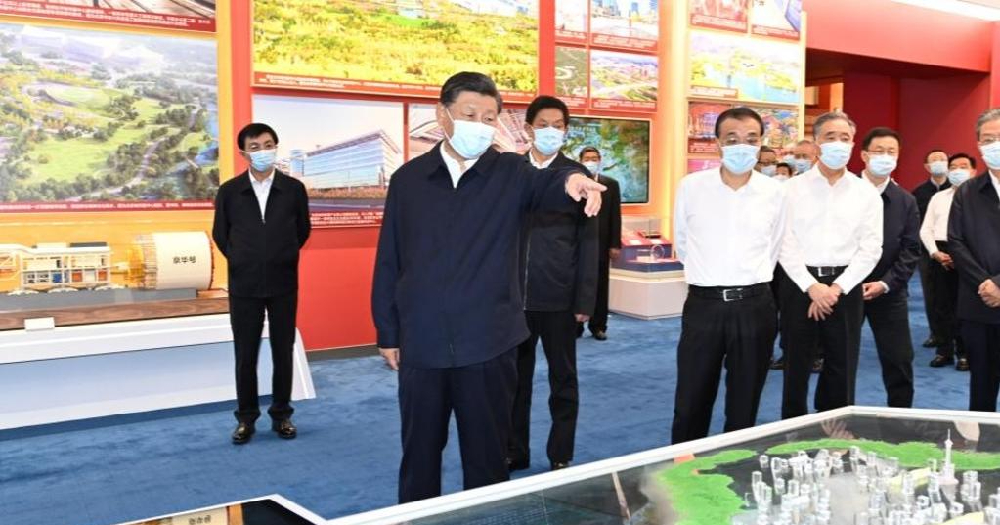Follow us on Telegram for the latest updates: https://t.me/mothershipsg
Over the weekend of Sep. 24 and 25, rumours of a "palace coup" taking place in Beijing spread on social media.
Several conspiracists alleged, without evidence, that a People's Liberation Army general had taken control of China's government and that Chinese President Xi Jinping had been put under house arrest.
Those rumours were not accurate.
Wild allegations
Over the weekend, a number of news outlets on social media began circulating rumours of a coup in China.
The allegations were consistent in a few major points.
Xi was supposedly under house arrest, People's Liberation Army General Li Qiaoming was leading the coup, and that over 6,000 flights had been cancelled.
https://twitter.com/reddygaru89_1/status/1573685776587669506
Evidence for this was scant to the point of being non-existent, short of one very poorly shot video of a highway, allegedly in Beijing, with a handful of military jeeps passing by.
#PLA military vehicles heading to #Beijing on Sep 22. Starting from Huanlai County near Beijing & ending in Zhangjiakou City, Hebei Province, entire procession as long as 80 KM. Meanwhile, rumor has it that #XiJinping was under arrest after #CCP seniors removed him as head of PLA pic.twitter.com/hODcknQMhE
— Inconvenient Truths by Jennifer Zeng 曾錚真言 (@jenniferzeng97) September 23, 2022
However, this story began to spread throughout Sep. 24 and began to be picked up by Indian social media.
Indian media outlets such as Outlook reported on the subject seriously, if not entirely believing it.
In public view
While Xi's whereabouts were unknown, it was just as easy to conceive of him under house arrest surrounded by crack units of the PLA, as it was to think of him binging on Game of Thrones.
That came to an end of Sep. 27 when Xi was seen in public.
According to the Associated Press (AP), Xi visited the "Forging Ahead into the New Era" exhibition at the Beijing Exhibition hall.
https://twitter.com/CCTV/status/1574943976771047424
This was more than a week after his last public appearance at the Shanghai Cooperation Organisation summit in Uzbekistan. He had returned to China on Sep. 16.
But according to AP, such an extended time period out of the public eye would not normally be considered notable.
Furthermore, if Xi had complied with established Covid procedures in China, he would have been under quarantine for at least a week.
So what's going on?
When CNA reported on Xi's reappearance in a segment on Sep. 27, their China correspondent Olivia Soong mentioned the rumours.
It's perhaps not hard to imagine why, as this analysis by MIT's Technology Review stated:
"Social media is still a mess of misinformation -- but you might not notice that mess if you are not familiar with the issue being discussed."
Technology Review traced the origin of the rumour, supposedly to a contributor to a Falun Gong backed media network.
The Falun Gong characterise themselves as a spiritual group persecuted by the Chinese Communist Party, but are considered by China's government to be a dangerous cult.
The historic animosity between the group and China's government is notable.
The contributor was also described by Technology Review as having a history of misinformation, as well as having actively played up the "coup" throughout the day of Sep. 24.
Is #XiJinping Under Arrest After #Military #Coup? 3 Senior Anti-Xi Officials Sentenced to Death
— Inconvenient Truths by Jennifer Zeng 曾錚真言 (@jenniferzeng97) September 24, 2022
Contradicting conclusions, evidence, & facts regarding Xi's mysterious "disappearing" after he returned to #China
Script at https://t.co/b2m1RBy4lM
Video at https://t.co/IHVGOxrSvf pic.twitter.com/0oenbjfl9B
But the rumour arguably took off when picked up by some of India's social media users and news outlets.
India and China are undergoing a period of increased geopolitical tension; and Technology Review notes that the average Indian social media user is not particularly knowledgeable about China.
This appears to have contributed to some having a lower threshold to accept the rumours.
Satirical tweets later reported straight
Perhaps the most alarming indication of this fact is this series of parody tweets that were reposted as fact.
The tweets, by Der Spiegel's Beijing Correspondent Georg Fahrion, who visited several notable Beijing landmarks and sarcastically suggested that ordinary scenes were secret symptoms of the non-existent coup.
Today in Beijing, I investigated the #chinacoup so you don’t have to. At considerable personal risk, I ventured out to some neuralgic key points in the city. Disturbing finds. Brace yourselves. /1 pic.twitter.com/z4CJYpQbbk
— Georg Fahrion (@schorselysees) September 25, 2022
But they were picked up the Republic Bharat TV channel and aired at face value.
A sarcastic thread by @schorselysees on #ChinaCoup was picked up by 'India's most viewed English/Hindi News Channel' @republic @Republic_Bharat, The pics shared in the twitter thread were shown by the channel as 'Exclusive Pics'. That's the state of most TV News channels in India pic.twitter.com/06GFuZmSJ6
— Mohammed Zubair (@zoo_bear) September 25, 2022
Even the seemingly alarming number 6,000 cancelled flights did not appear to make a difference in the air traffic over China.
As for the rumor going around about flights being cancelled, air space closed etc. in China related to the coup rumor.
— Oliver Alexander (@OAlexanderDK) September 23, 2022
Number of flights over China right now is pretty much identical to exactly one week ago. pic.twitter.com/K6BUn7Mv8C
Speculation about Xi's position was perhaps inevitable in the lead up to an important Party Congress, where Xi is expected to be anointed party leader for a third term, an unprecedented event since the days of Mao Zedong.
But in the end, these incredible rumours were just that: not credible.
Stories you might be interested in
Top image via @CCTV/Twitter
If you like what you read, follow us on Facebook, Instagram, Twitter and Telegram to get the latest updates.
